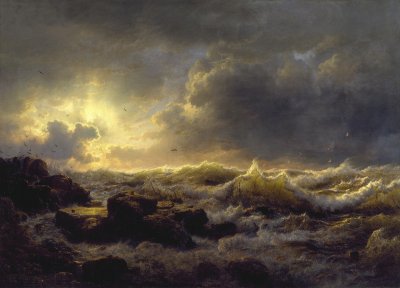In the next part of our series on the message of the Old Testament prophets, Gary Clayton looks at the Prophet Jonah.
Jonah (the name means 'dove') son of Amittai, the prophet from Gath Hepher (2 Kings 14:25), was a native of Galilee. He lived, it is thought, around the time of Jeroboam II, during the seventh or mid-eighth century BC.
The Historical Background
Under Jeroboam II (793-753 BC) Israel and its capital, Samaria, flourished. The king "restored the boundaries of Israel from Lebo Hamath to the Sea of the Arabah" (2 Kings 14:25), recovering Israel's northern borders. Lucrative trade pacts were signed with the Phoenicians of Tyre and wealth flooded into the now prosperous kingdom.
The people, it was no doubt said, had never had it so good - though discrimination and injustice were rife. It was into this situation that the prophets Amos and Hosea were to speak.
Jonah, however, was given a different message. He was told to "go to the great city of Nineveh and preach against it" (Jon 1:2). Founded by Nimrod the hunter (Gen 10:8-12), Nineveh became one of the richest and most powerful cities in the world.
From the eighth century BC to its destruction in 612 BC, it was the capital of the Assyrian empire, and was situated on the left bank of the River Tigris, just 280 miles north of Babylon.
Nineveh was a rich and powerful city – the stronghold of a warlike people who massacred and mutilated those they defeated.
 Mosul, Iraq, is modern-day Nineveh.Protected by a wall seven and a half miles long and 100 feet high, Nineveh was defended by 1,500 towers, each of them 200 feet high. It was the stronghold of a warlike people who massacred and mutilated those they defeated, believing themselves to be engaged in a cosmic battle on behalf of Ashur, their god.
Mosul, Iraq, is modern-day Nineveh.Protected by a wall seven and a half miles long and 100 feet high, Nineveh was defended by 1,500 towers, each of them 200 feet high. It was the stronghold of a warlike people who massacred and mutilated those they defeated, believing themselves to be engaged in a cosmic battle on behalf of Ashur, their god.
Already, by the time of Jonah, the Assyrians represented a formidable threat to Israel's security. Indeed, in 721 BC Sargon II occupied Samaria, deporting 27,210 Israelites to Assyria for slave-labour.
Jonah: A Good Example?
Despite God's commission, Jonah fled to Joppa (modern day Jaffa) instead. Whether he did so in a fit of pique or from fear, we do not know.
In many ways, however, one could regard Jonah as an example that many believers might do well to follow. He not only believed in God, but was willing to testify to his existence (Jon 1:9), regardless of the consequences (Jon 1:11,12). He also took time to listen to his Maker and obviously heard his voice clearly (Jon 1:1; 3:1; 4:4; 4:9-11).
Another point in Jonah's favour was his willingness to address God in prayer and communicate his concerns (Jon 2:1-9; 4:2-3; 4:8-9), as it says in 1 Peter 5:7, "Cast all your anxiety on him because he cares for you." Like Nathanael in John 1:47, Jonah was a man without guile, "in whom there is nothing false". He 'tells it like it is.' Whether in anger, discomfort, frustration or distress, he brought his hurts before the Lord, just as Elijah and Moses had done centuries earlier.
Jonah was brave too, in his way (Jon 1:12), as well as honest (Jon 1:10). Indeed, he would make an almost entirely admirable character if, having received his instructions from God, he had responded by setting off in the right direction.
God Will Always Triumph
As it is, oblivious to the truth of Psalm 139:8-10, "If I go up to the heavens, you are there; if I make my bed in the depths, you are there. If I rise on the wings of the dawn, if I settle on the far side of the sea, even there your hand will guide me, your right hand will hold me fast", he set sail for Tarshish (in what is now southern Spain) thinking that he could escape God. It was as far from Nineveh as one could possible get in the ancient world.
In many ways, Jonah was an example we would do well to follow.
God, however, had other ideas. Jonah may have been the right man for the right time, but he was certainly in the wrong place, thus prompting some Divine intervention in the form of adverse weather conditions.
Everyone (it would seem) was afraid - except Jonah (Jon 1:5-6) who, asleep and apparently oblivious to the sea raging around him, knew how best the storm might be stilled, albeit by somewhat dramatic means (Jon 1:15). At fault though he was, Jonah was willing to be thrown overboard, rather than allow those on the ship to perish (Jon 1:12).
Although Jonah refused to go to Nineveh, no doubt hoping that the Assyrians would die in their sins rather than repent and live (Jon 3:10), God had other ideas. Romans 8:28 tells us, "In all things God works for the good of those who love him, who have been called according to his purpose."
As with Joseph's brothers in Genesis 50:20, what Jonah intended for 'harm', God planned for good, with Jonah's attempt at escaping from God resulting in the salvation of those heading for Tarshish (Jon 1:15,16). The book teaches us that we can run from God, but we cannot hide. Ultimately he will have his way, whether we co-operate or not.
A Light to the Gentiles
Jonah, however, had yet to learn that not only could merchants and seafarers turn to the Lord, but so could the violent and rapacious Assyrians (Jon 3:5-9). So it was that, having had his life miraculously preserved by the fish, Jonah ended up vomited onto dry land (Jon 2:10), though nowhere near Nineveh (Assyria is not on the coast).
What Jonah intended for harm, God planned for good, resulting in the salvation of those on board Jonah's ship.
The miraculous events of Jonah's ministry foreshadowed the death, resurrection and preaching of the Lord Jesus centuries later (Matt 12:39-41; 16:4; Luke 11:29-32). However reluctant, Jonah represents one of Scripture's earliest recorded instances of the Jews acting as a light to the Gentiles, bringing salvation and blessing.
A Second Chance
Once on dry land, the word of the Lord again came to Jonah. Not surprisingly, he obeyed. The calling and gifting may have been there from the start, but the initial motivation was clearly lacking. A storm at sea and a three-day sojourn in the belly of the fish, however, must have concentrated his mind wonderfully! So Jonah set off to land-locked Assyria, preaching repentance to a city of over 120,000 souls.
It has often been said that 'there is no such thing as an atheist in a foxhole'. Whether in time of flood, famine, earthquake or calamity, when disaster threatens, people cry to the Lord. In Psalm 107 we read, "Then they cried out to the Lord in their trouble, and he delivered them from their distress," while "those who cling to worthless idols forfeit the grace that could be theirs" (Jon 2:8).
The Ninevites, however, took God at his word, accepting Jonah's message and acting upon it (Jon 3:7-9). The result: repentance and revival.
A Fishy Tale – or Historical Fact?
Although it is not so unusual for fishermen to tell tall tales about 'the one that got away', in the book of Jonah we learn of a prophet and evangelist - a fisher of men, if you will - who got away, having been swallowed by a fish.
There are those, however, who dispute whether, shaken and possibly stirred, he actually physically emerged from a large fish, maintaining that the account is an elaborate allegory or fairy tale. Accounts of similar occurrences do, however, exist:
- Apparently swallowed by a harpooned sperm whale in the vicinity of the Falkland Islands in 1891, James Bartley was said to have been found in the whale's stomach, unconscious, some three days after the creature had been caught, killed and cut open. The man, it is alleged, was successfully revived, though his skin had been bleached white by the whale's gastric juices. The case was recorded in the Princeton Theological Review of 1941, though some have questioned the story's veracity, their criticisms of that particular account themselves conflicting.
- In The Harmony of Science and Scripture, Dr Harry Rimmer (DD, ScD) tells of personally meeting a sailor who was swallowed by a gigantic Rhincodon whale shark and was subsequently revived, though suffering from shock. Exhibited in a London museum at a shilling admission, the sailor was billed as 'The Jonah of the Twentieth Century'.
- It is a fairly common experience today for fishermen, on cutting open a whale, to discover that it has swallowed a shark or large fish the size of a man.
According to The International Standard Bible Encyclopedia (Paternoster Press), "It is possible to identify the revival at Nineveh with the religious reforms brought about by Adadnirari III circa 800 BC," noting that if Jonah had arrived in Nineveh during the reign of Assur-dan III, "he would have found the city psychologically prepared for a total catastrophe, since a plague had swept the city in 765, an eclipse of the sun had occurred in 763, and a second plague had followed in 759 BC."
God's timing is, of course, perfect. Whatever the historical circumstances, God knew that, were Jonah to preach to the Ninevites, they would fast, repent and be spared. As 2 Peter 3:9 reminds us, "The Lord...is patient with you, not wanting anyone to perish, but everyone to come to repentance," for he is "a gracious and compassionate God, slow to anger and abounding in love, a God who relents from sending calamity" (Jon 4:2).
Jonah is one of Scripture's earliest examples of the Jews acting as a light to the Gentiles.
The Message of Jonah
In a perverse and sinful generation, however, there is a tendency for God's followers, like Jonah, to be more concerned with their own safety, comfort and reputation (Jon 1:3; 2:2; 4:1-3; 4:8-9) than with the salvation of those around them (Jon 4:10-11). Philippians 2:21 notes, "For everyone looks out for his own interests, not those of Jesus Christ."
The lesson Jonah needed to learn, having experienced God's loving care for him through the incident with the fish (Jon 1:17) and with the vine which sheltered him from the heat (Jon 4:6), was his need to forgive the Assyrians, as the Lord forgave him (Col 3:13). This is the message that lies at the heart of the gospel, the good news, for if we forgive people when they sin against us, our heavenly Father will also forgive us (Matt 6:14,15).
Moreover, in accepting God's forgiveness, we are to offer that forgiveness to others through the preaching of the word, in season and out of season, whether - like Jonah - we feel like it or not.
First published in Prophecy Today, Vol 11 No 5, September 1995. Revised October 2016.




